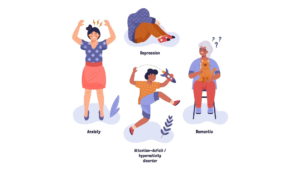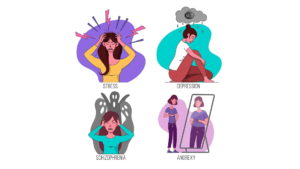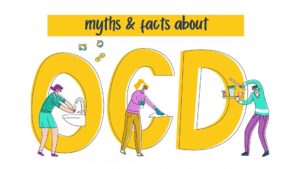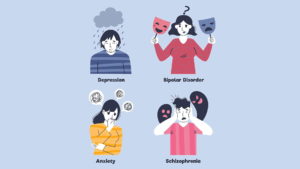Millions of people throughout the world suffer from Obsessive-compulsive disorder (OCD), a mental and behavioral disorder. It is important to spell out that OCD is more than just being tidy, well-organized, or following certain customs like it is understood. Instead, it is characterized by intrusive thoughts (called obsessions) and repetitive actions (called compulsions) that people feel driven to carry out to reduce the distress those ideas produce.
To put it simply, Obsessive-compulsive disorder is like having the impression that you are stuck on an endless round. Your mind is racing, and you cannot stop thinking about it. This is a genuine feeling for many people who suffer from obsessive-compulsive disorder. OCD is a complicated mental health disorder and is not only about having odd habits or being extremely neat.
Furthermore, Obsessions and compulsions are the two primary characteristics that define Obsessive-compulsive disorder. Unwanted and annoying thoughts that cause a great deal of anxiety or pain are called obsessions. These ideas can feel overwhelming and range from worries about hurting other people to fear of impurity.
People frequently route to compulsions, which are repetitive actions or mental acts carried out in reaction to obsessive thoughts, to reduce this uneasiness. These compulsive behaviors can range from frequent hand washing to counting, verifying, or arranging objects in a particular manner.
However, it is not as easy or simple because Comprehending Obsessive-compulsive disorder is essential for those who suffer from it, as well as for their friends, family, and society at large. This disorder has a lot of myths, which cause stigma and misperception.
Comprehending Obsessions and compulsion in detail

Unwanted, intrusive thoughts, ideas, or urges that significantly increase worry or distress are called obsessions in Obsessive-compulsive disorder.
Common obsessions include:
- Fear of contamination: Excessive cleaning or escaping activities slowing from worries about dirt or pathogens.
- Fear of hurting other people: Inescapable ideas of hurting someone, whether on purpose or by mistake, which can lead to severe anxiety and guilt.
- Fear of making mistakes: An intense need to make sure everything is flawless or accurate, which frequently results in obsessive checking habits.
- Fear of losing control: Concerns about acting in ways that are contrary to one’s values or morals.
Compulsions in Obsessive-compulsive disorder are periodic actions or thoughts that someone feels compelled to carry out as a result of an obsession.
Obsessive-compulsive disorder Compulsions include, for example:
- Cleaning routines: To calm concerns about contamination, excessive hand washing, surface cleaning, or disinfection.
- Checking behaviors: Constantly making sure that locks, appliances, or personal belongings are secure.
- Counting or ordering: To lessen tension, use certain counting procedures or arrange items in a certain order.
- Reassurance seeking: it is the practice of continuously seeking comfort from others to calm concerns about one’s own ideas or behavior.
Symptoms of obsessive compulsive disorder in adults

Although symptoms of obsessive compulsive disorder in adults can differ greatly from person to person, they often fall into the categories of compulsions and obsessions.
Here are a few representative symptoms to watch out for:
- Obsessive symptoms of Obsessive-compulsive disorder include unwanted or upsetting intrusive thoughts.
- Fears of uncertainty, damage, or contamination
- Too much focus on symmetry, order, or particular configurations
Symptoms of compulsivity
- Handwashing, checking, and counting are examples of repetitive actions meant to lower anxiety.
- Mental practices used to prevent a feared outcome, such as silent counting or supplication
- Taking part in activities that can disrupt daily life and consume a lot of time (for example, many hours each day)
Important Information Regarding OCD Co-occurring Disorders

Some people who suffer from Obsessive-compulsive disorder may also have tic problems.
- Motor Tics: Abrupt, fleeting, repeating motions, including blinking or other eye movements
- Grimacing of the face
- Shrugging the shoulders
- Jerking of the head or shoulders
- Tics for Voice: Repeated noises like:
- Clearing the throat
- Noticing
- Sounds of mumbling
Furthermore, Anxiety disorders and mood disorders, such as depression, are frequently present in people with Obsessive-compulsive disorder.
Symptom onset:
- Although Obsessive-compulsive disorder symptoms can appear at any age, they usually first appear in late childhood or early adulthood.
- Young adults receive the majority of diagnoses.
The character of Symptoms:
- OCD symptoms might appear gradually and change over time, getting better and then getting worse.
- Symptoms are frequently made worse by stressful circumstances.
- Compulsions and obsessions can evolve over time.
Coping mechanism
- Obsessive-compulsive disorder sufferers must avoid circumstances that make them feel worse.
- The absurdity of their compulsive actions is recognized by many adults with OCD.
- Youngsters with OCD may not recognize that their actions are out of the ordinary and frequently worry about the consequences of breaking specific practices.
Symptoms of OCD in relationships

The symptoms of OCD can have a major effect on relationships, posing difficulties for the OCD sufferer as well as their companion, family, or friends. Symptoms of OCD in relationships include the following:
Excessive Need for Comfort
People may constantly ask their partners for confirmation about their emotions, actions, or relationship status, which can be frustrating for both of them.
Fear of Pollution
People with Obsessive-compulsive disorder may avoid physical contact or certain activities because they feel that they or their partner are contaminated (by substances or pathogens, for example).
Unwelcome Thoughts
Anxiety and tension may result from the person having undesirable and upsetting thoughts about their relationship, such as worries about cheating, hurting their partner, or doubting their love.
Obsessive Behavior
Compulsions like checking messages frequently, and cleaning items their spouse has touched, might disrupt everyday activities or social interactions.
Perfectionism
Unrealistic expectations for oneself and one’s spouse can result from an excessive drive for relationship perfection, which can lead to stress and discontent.
Overanalyzing how things work together
People with Obsessive-compulsive disorder may constantly review previous interactions or discussions, fretting over alleged errors or misunderstandings, which can cause anxiety and self-doubt.
Control Problems
In Obsessive-compulsive disorder, Fears of injury or unpredictability may give rise to an inclination to want to control the partner’s behavior or other parts of the relationship.
Distress on an emotional level
Obsessive-compulsive disorder symptoms can have a negative emotional impact on a relationship by causing impatience, mood swings, or departure.
Effect on Trust
Compulsive behaviors or intrusive thoughts might cause trust concerns, which can cause miscommunications and conflict in the relationship.
Therefore, taking Care of OCD in Relationships is important.
- There must be open Communication regarding the impact of Obsessive-compulsive illness symptoms on the relationship.
- Individual or couples therapy can assist both spouses in better understanding Obsessive-compulsive disorder and creating coping mechanisms.
- Gaining knowledge about the disease might help people become more empathetic and less misunderstood.
- The equilibrium of the relationship can be preserved by establishing sound boundaries around compulsive behaviors.
Facts versus Myths about Obsessive-compulsive disorder

- Myth: OCD is just an individual’s personality.
- Factual statement: OCD is a recognized mental health condition that has to be understood and treated.
Causes of Obsessive-compulsive disorder

OCD has many different and complicated origins, including a mix of environmental, neurological, and hereditary variables.
Genetic OCD may run in families, according to research, suggesting a genetic component. But not everyone who has a family history will end up with a problem.
Factors related to the nervous system
Research has indicated that some brain regions, including the orbitofrontal cortex and basal ganglia, may exhibit altered activity in OCD subjects. These areas have a role in emotional control, habit formation, and decision-making.
Environmental Factors
OCD symptoms can be brought on by or made worse by traumatic events, ongoing stress, or major life transitions. Having a thorough understanding of these elements can help in creating beneficial coping mechanisms.
Aspects of Psychology
OCD may be more likely to develop in people with particular cognitive patterns, such as perfectionism or an excessive sense of responsibility.
Options for Obsessive-compulsive Disorder Treatment
The most successful treatment for Obsessive-compulsive disorder is cognitive-behavioral therapy (CBT), which focuses on recognizing and altering harmful thought patterns.
ERP or Exposure and Response Prevention therapy is a type of cognitive behavioral therapy created especially for OCD, involving exposing patients to frightening situations gradually while avoiding compulsive reactions.
How common is OCD?

Among mental health conditions, obsessive-compulsive disorder (OCD) is relatively predominant.
According to studies, between 1% and 3% of people are affected by OCD.
Present Prevalence: Approximately 1% of persons have an OCD diagnosis at this time.
Many cases of Obsessive-compulsive disorder start between the ages of 10 and 25, though it can start in childhood, adolescence, or early adulthood. But later in life, symptoms may also manifest.













